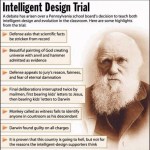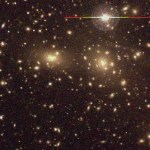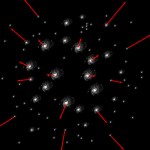universe
Maybe it's the upcoming election and the potential change that it portends. Or perhaps it's the Large Hadron Collider, bogged down with electric failures, that has ceded the science-news space to other subjects. In any case, the last week has seen a slew of exciting, weird, and prescient science news too exciting to ignore, and too varied to all discuss in depth.
For one, the impersonal blackness of space welcomed a new nation as the Chinese launched their much-anticipated Shenzhou VII spacecraft, manned with three "taikonauts" trained for the country's first spacewalk. Technologically…
When I think of molecules, I think of Conan O'Brien doing his skit where he plays Moleculo...
the molecular man! I don't think of astronomy, and I certainly don't think of the leftover radiation from the big bang (known as the cosmic microwave background)! But somebody over at the European Southern Observatory put these two together and made an incredibly tasty science sandwich.
See, we can measure the cosmic microwave background today, because we have photons (particles of light) coming at us in all directions at all locations, with a temperature of 2.725 Kelvin. Theoretical cosmology…
Even creationists have said that if you find something that's alive now that's over 6000 years old, it would prove to them that the Earth is at least that old.
Previously, the oldest tree in the world was thought to be a Bristlecone Pine in California, known as the Methuselah tree, at 4,840 years old (as of 2008).
It's huge! But you can also date a tree not by its trunk, but by its root structure. And as The Log Blog reports, Swedish researchers have found a tree on Fulu Mountain that is over 9,000 years old! Although it looks puny because its trunk dies every few hundred years or so and it…
Since the dawn of time man has yearned to destroy the sun. - C. M. Burns
There's no need to stop at the Sun, though. Since yesterday was Earth day, I thought it was only appropriate to spend today telling you how not only to destroy the Earth, but to effectively destroy the entire Universe. To tell you this story, we have to go all the way back to the beginning, to just before the big bang.
The big bang was when the Universe was hot, dense, full of energy, and expanding very quickly. The Universe was also spatially flat and the same temperature everywhere, and full of both matter and…
Bret Underwood, a friend of mine from my time in Madison, WI, saw my post on String Theory, and took issue with my statement that it wasn't testable. I'm still standing behind what I said, but let's address what Bret has to say.
I donât understand your argument above for why string theory is untestable. In fact, it seems to me you just outlined the best possible case for string theory! What you said above is that if I have a string theory construction of a phenomenon (say, the Standard Model or Inflation), which uses a set of parameters X, and makes some predictions, then I can find another…
What is the future of this website? I'm going to be creating videos for the web about the Universe. I'll be answering questions ranging from what the Universe is like today to how it got to be that way. I'm going to address every step that we know of, from the Big Bang up to the present day.
And I'm going to do it naturally, by telling the story as the Universe tells it directly to us. I call this project Genesis. Check out the teaser trailer below, and tell your friends, because this is coming in January.
Fraser Cain over at Universe Today sent out a question to the Astronomy/Astrophysics/Space communication community today. And he asks:
Why should we spend our time/money/resources on exploring space when there are so many problems here on Earth?
This is something that, for better or worse, I had a knee-jerk reaction to. Here's what I wrote back to him:
This is like asking why we should spend money on making our city better when there are so many problems here in our own homes. Or why we should spend money on understanding our whole world when there are so many problems here in our own…
So, what's the deal with this one? startswithabang.com reader Scott Stuart asks the following question:
I was reading "The First Three Minutes" last night and came across an
interesting section about blackbody radiation and energy density. The
author states that as the universe expands, the number of photons
running around (in the CMB, for example) is unchanged, but their
wavelengths get stretched. The energy in a photon is, of course,
inversely proportional to its wavelength, so the energy content of a
photon decreases as its wavelength increases. That seems to mean that
the total energy…
There's a movie coming out on Creationism, Intelligent Design, and Evolution, called Expelled, and it's narrated/hosted by Ben Stein (right), a TV/film personality who is an overall intelligent guy (and used to have the TV show Win Ben Stein's Money), and used to be a Nixon speechwriter. Politically, he's quite conservative (for example, immediately following 9/11 he gave a speech where he called abortion "the worst form of terrorism"), but this movie is apparently one of the worst abuses of science since What the Bleep do We Know?! came out.
The movie has an innocuous enough premise: is…
This month's issue of Physics Today has an interesting article by Robert Brandenberger of McGill University, entitled Alternatives to Cosmological Inflation. As a refresher, cosmological inflation is the theory that sets up the Big Bang: it takes whatever was in the Universe prior to inflation and expands it away, leaving you with a Universe that has roughly (to a few parts in 100,000) the same properties everywhere, and is spatially flat.
There are many models of inflation which give a Universe like ours, although we have to fine-tune the parameters of it. For instance, if we treat…
Last week, Pamela Gay over at Star Stryder pointed me to a press release which claimed that, among other things, perhaps dark matter wasn't necessary. So I wrote a guest post on her blog explaining why it was. Apparently, some people still aren't convinced. So I will lay out for you all the reasons I can think of why we need it, and explain what happens if you try to do without it.
1. Cluster Velocity Dispersions. When we take a look at galaxies, we often find hundreds or even thousands of them clustered together, like in the Coma Cluster. We can measure how quickly those galaxies are moving…
The Universe isn't a static place. Although the laws of nature (physics, chemistry, biology, etc.) don't appear to change over time, everything in the Universe appears to evolve, and changes over time. One of the simplest ways that this happens is through Hubble expansion.
General relativity tells us how the Universe expands, and more specifically, it tells us that the expansion rate (which we call the Hubble constant, H0) is related to the total energy density of the Universe. More matter density: faster expansion. Greater density of photons (i.e., light): faster expansion. More of any and…







